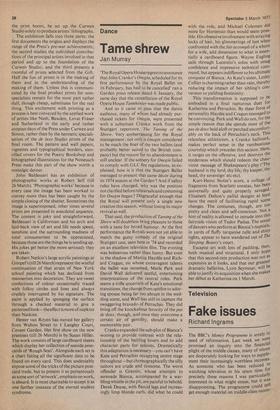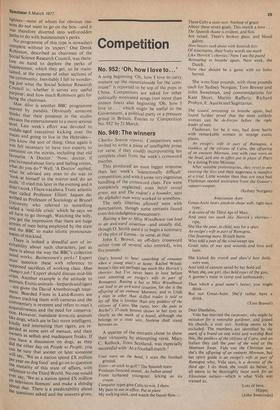Television
Fake issues
Richard Ingrams The BBC's Money Programme is sorely in need of reformation. Last week we were promised an inquiry into the financial plight of the middle classes, many of whom are desperately looking for ways to supPlement their increasingly worthless incomes. As someone who has been reduced to watching television in his spare time for precisely these reasons I was particularlY interested in what might ensue, but it was disappointing. The programme could not get enough material on middle-class moon lighters—most of whom for obvious reasons do not want to go on the box—and it was therefore diverted into well-trodden Paths to do with businessmen's perks. No programme of this type is nowadays complete without its 'expert.' One Derek Robinson, described as chairman of the Social Science Research Council, was therefore on hand to deplore the perks of businessmen, which they get, so he maintained, at the expense of other sections of the community. Inevitably I fell to wondering just what the Social Science Research Council is; whether it serves any useful Purpose; and how much Robinson gets for being the chairman.
Man Alive is another BBC programme Marred by pundits. Obviously someone thinks that their presence in the studio elevates the entertainment to a more serious level. Last week's effort was devoted to Middle-aged executives kicking over the traces and going to live in the Hebrides— You know the sort of thing. Once again it Was felt necessary to have two experts to comment on the stories, including that old favourite 'A Doctor."Now, doctor, if You're round about forty and feeling rotten, . What do you do?' Well, 'A Doctor' replied, 'look he advised any man to do was to look at himself in the mirror and do an
(1. tried this later in the evening and it didn't work .) There was also a Trans atlantic man called Professor Elliott Jaques , described as Professor of Sociology at Brunel University who referred to something called a 'mid-life crisis' which he says we all have to go through. Watching the telly, You get the impression that there are huge armies of men being employed by the state and the BBC to make idiotic pronounceMents of this kind.
There is indeed a dreadful sort of inevitability about such characters, just as there is about the way the BBC's collective Mind works. Businessmen's perks? Expert Must question these with reference to suPPosed sacrifices of working class. Man Changes job ? Expert should discuss mid-life crisis. Another example is the attitude to animals. Exotic animals—leopards and tigers —are given the David Attenborough treatTMBearded Finns in Land-Rovers are Shown tracking them with cameras and the commentary is reverent and refers to man's acquisitiveness and the need for conserveton. However, mundane domestic animals like dogs, which are in fact more intelligent, kindly and interesting than tigers, are regarded as some sort of menace, and their owners as selfish and inadequate. freaks. If You have a discussion on dogs, as they did the other day on People to People, you can be sure that 'sooner or later someone will say, 'We as a nation spend EX million Per Year on dog food' and go on to question the morality of this state of affairs, with reference to the Third World. No one would ever say, 'We as a nation spend EX million O n television licences' and make a shindig about that There is a predictability about the questions asked and the answers given.



































 Previous page
Previous page